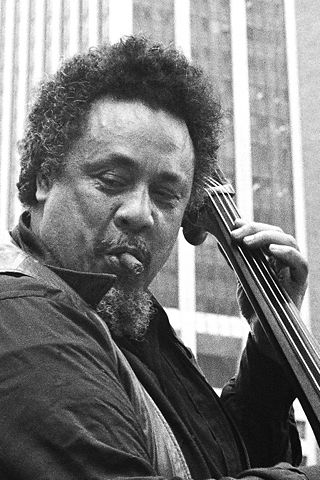
Charles Mingus Jr. was an American jazz upright bassist, composer, bandleader, pianist, and author. A major proponent of collective improvisation, he is considered to be one of the greatest jazz musicians and composers in history, with a career spanning three decades and collaborations with other jazz greats such as Duke Ellington, Charlie Parker, Max Roach, and Eric Dolphy. Mingus's work ranged from advanced bebop and avant-garde jazz with small and midsize ensembles, to pioneering the post-bop style on seminal recordings like Pithecanthropus Erectus (1956) and Mingus Ah Um (1959), and progressive big band experiments such as The Black Saint and the Sinner Lady (1963).
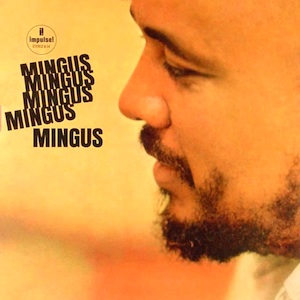
Mingus Mingus Mingus Mingus Mingus is a studio album by the American jazz composer and bassist Charles Mingus which was released on January 9, 1964.
Epitaph is a composition by jazz musician Charles Mingus. It is 4,235 measures long, takes more than two hours to perform, and was only completely discovered during the cataloguing process after his death. With the help of a grant from the Ford Foundation, the score and instrumental parts were copied, and the work itself was premiered by a 30-piece orchestra, conducted by Gunther Schuller and produced by Mingus's widow, Sue, at Alice Tully Hall on June 3, 1989, 10 years after his death, and issued as a live album. It was performed again at several concerts in 2007.
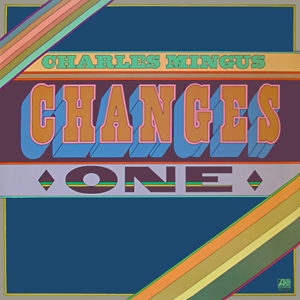
Changes One is an album by the jazz composer and bassist Charles Mingus, released in 1975.

Charles Daniel Richmond was an American jazz drummer who is best known for his work with Charles Mingus. He also worked with Joe Cocker, Elton John and Mark-Almond.
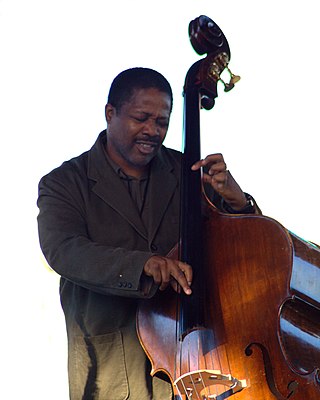
Rodney Whitaker is an American jazz double bass player and educator.

Let My Children Hear Music is an album released by Columbia Records in 1972 of music by composer Charles Mingus, produced by Teo Macero. The music is scored for large jazz orchestra and Mingus worked with several arrangers, orchestrators and conductors, most notably Sy Johnson and Alan Raph, to realize some of his most ambitious compositions. In the original liner notes, Mingus described it as "the best album I have ever made".

Ricky Ford is an American jazz tenor saxophonist.
Mingus Dynasty was an American jazz ensemble formed in 1979, just after the death of Charles Mingus, which featured many musicians Mingus recorded or played with. The group was named after the 1959 album Mingus Dynasty.
Ronnie Burrage is an American jazz drummer. His style draws from jazz, funk, and soul.
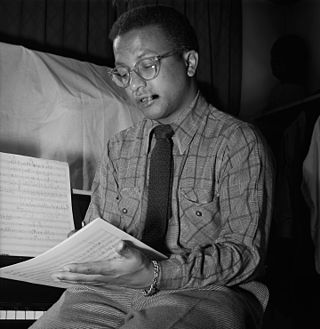
"Chelsea Bridge" (1941) is an impressionistic jazz standard composed by Billy Strayhorn.
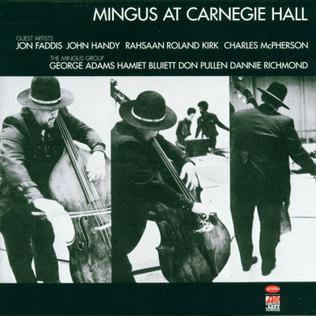
Mingus at Carnegie Hall is a live album by the jazz bassist and composer Charles Mingus, recorded at Carnegie Hall in January 1974 by Mingus with Jon Faddis, Charles McPherson, John Handy, George Adams, Rahsaan Roland Kirk, Hamiet Bluiett, Don Pullen, and Dannie Richmond. The original release did not include the first part of the concert, featuring Mingus’s working sextet without Handy, Kirk, and McPherson. An expanded “Deluxe Edition” including the entire concert, was issued in 2021.

Cornell 1964 is a live album by jazz bassist and composer Charles Mingus, featuring multi-instrumentalist Eric Dolphy. It was recorded at Cornell University in Ithaca, New York, on March 18, 1964.

Pre-Bird is an album by jazz bassist and composer Charles Mingus consisting of music that was composed before Mingus first heard Charlie Parker, hence the title Pre-Bird. It was released on Mercury Records in September 1961.

Mingus at Monterey is a live album by the jazz bassist and composer Charles Mingus, recorded in 1964 at the Monterey Jazz Festival and originally released on Mingus's short-lived mail-order Jazz Workshop label but subsequently released on other labels.
The Jazz at Lincoln Center Orchestra is an American big band and jazz orchestra led by Wynton Marsalis. The Orchestra is part of Jazz at Lincoln Center, a performing arts organization in New York City.
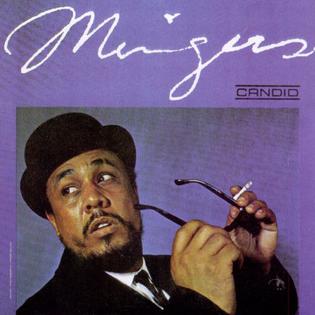
Mingus is an album by the jazz bassist and composer Charles Mingus. The album was recorded in October and November 1960 in New York and released in late 1961 on Nat Hentoff's Candid label.

The Complete Town Hall Concert is a live album by the American bassist, composer and bandleader Charles Mingus, recorded at The Town Hall in New York City and first released on the United Artists label in 1962 as Town Hall Concert. The album was rereleased with additional tracks on the Blue Note label in 1994 as The Complete Town Hall Concert.
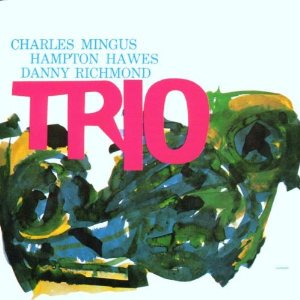
Mingus Three is an album by American bassist, composer and bandleader Charles Mingus with pianist Hampton Hawes and drummer Dannie Richmond which was recorded in 1957 and first released on the Jubilee label.

Live at Jazz Standard is an album by the Mingus Big Band that won the Grammy Award for Best Large Jazz Ensemble Album in 2011. The album documents a concert at the Jazz Standard club in New York City on New Year's Eve, 2009. The concert and the album commemorate the fiftieth anniversary of songs recorded by Charles Mingus. The band was conducted by Gunther Schuller and included trumpeter Randy Brecker, who played with Mingus during the 1970s.
















